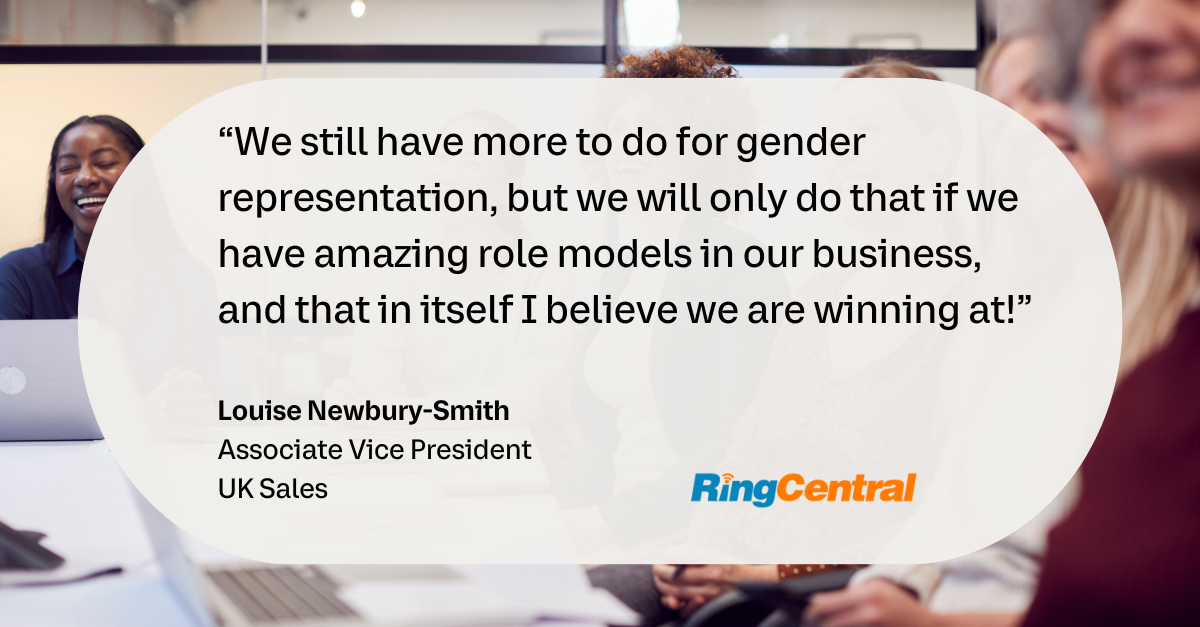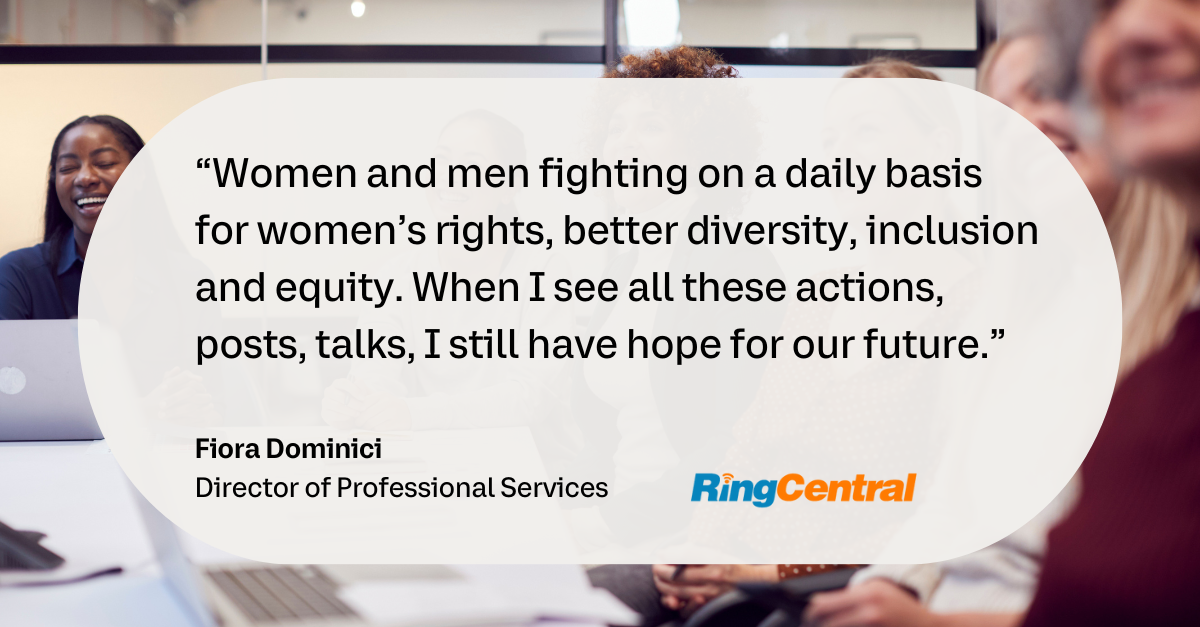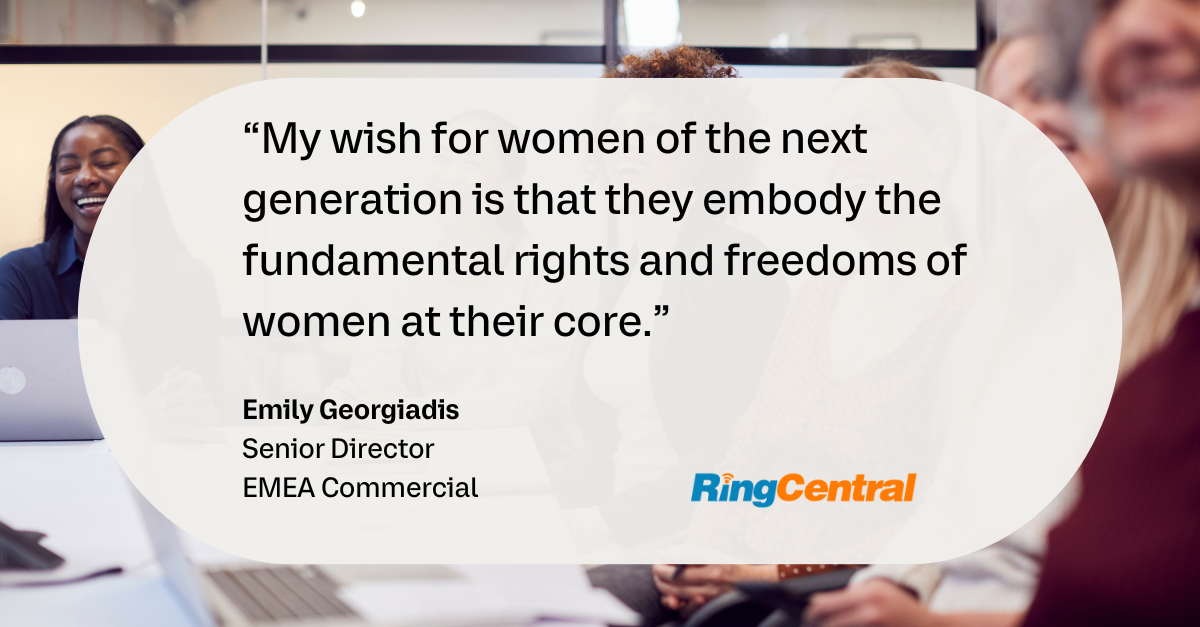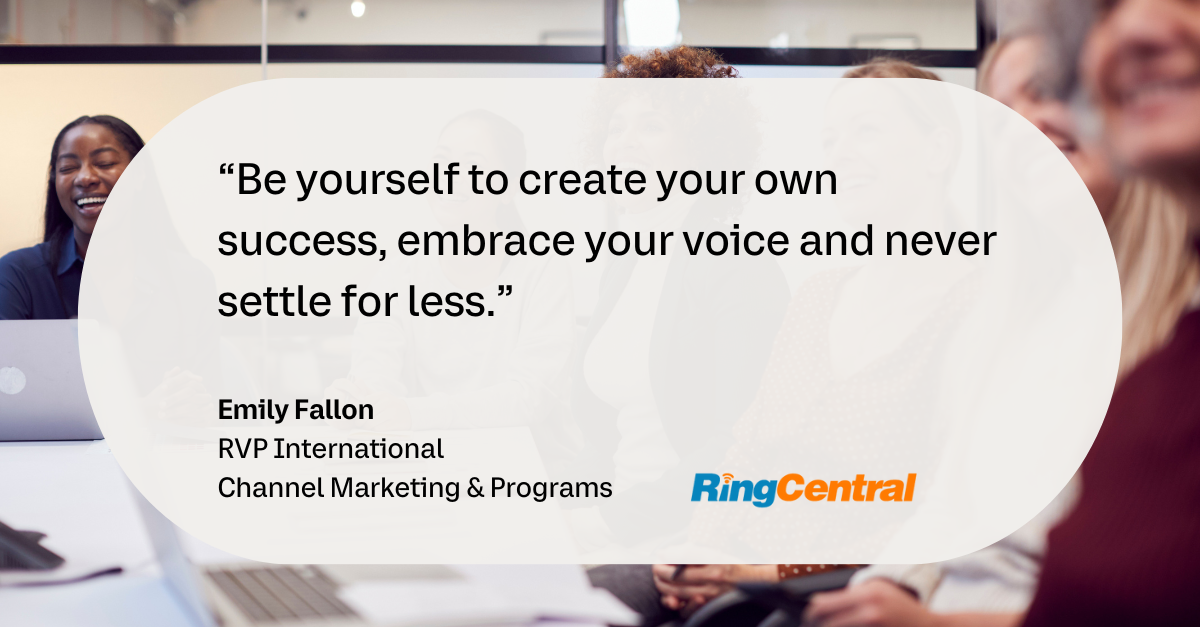Since 1910, March 8 has been recognised as International Women’s Day. This year, it is dedicated to the theme of inspiring inclusion. So, even if raising awareness about the bias and discrimination towards women remains necessary, let’s focus on the positive: progress and hope!
We interviewed four women from RingCentral who are paving the way towards a gender equal, diverse, equitable and inclusive workplace on a daily basis. This year is the time to combat stereotypes, support all women as a group and celebrate each woman as an individual.
Let’s dive into the testimonies from:
- Emily Fallon, RVP, International Channel Marketing & Programs
- Emily Georgiadis, Senior Director EMEA Commercial
- Fiora Dominici, Director of Professional Services
- Louise Newbury-Smith, Associate Vice President UK Sales.
The situation for women is improving, but things are not where they should be. What’s the most annoying thing for you with regards to women’s rights?
Fiora: The salary gap and career impact: Women already give so much of themselves to society. Not just their jobs and careers, but also their bodies, their time and their mental health to bring up tomorrow’s children. Even if sharing household tasks within couples is improving, we’re still a long way off (2/3 of household tasks are still managed by women). On top of that, should women be paid less than men for equal work?
Louise: I’m answering this question, and at the same time I’m not answering this question. I’ve faced some challenges, discrimination etc in the past and have even written about it in blogs. But I’m no longer sure that focussing on it this way is helpful. I think we are better off celebrating the achievements of women and allies, and not holding on to the negativity, as otherwise we run the risk of staying in that negative place, whereas success breeds success, so we should focus on that instead.
Can you share an anecdote from your life at work that was pivotal to your vision about women’s rights and their position in the workplace?
Fiora: One of the examples that shocked me the most was unfortunately an incident in a previous company. It happened during a seminar, so with all the employees and after a more than drunken evening, one of the employees (manager) found himself the next morning running naked in front of the employees, hotel staff and hotel guests, climbing on a table. I let you imagine the rest … Sadly, what shocked me the most at the time was how the management handled it at the time. For them, it was part of the party. It was “”rock’n roll””. There was no action. Except that it wasn’t a student party, it was a company seminar and there were several of us, women but not only, who were shocked by this.
In the end, the only way I could get our manager to react was to ask him, during a 1:1 meeting, what he would have thought if a woman had been on that table. Would he have called it “”rock n roll””, would he have called her the same. He didn’t know how to answer me…
It was then that I realised that we women were never treated as equals and that we always had to face prejudice and fight against it.
With so many priorities when it comes to women’s rights, where do we even start?
What is the main priority regarding women’s rights to date?
Fiora: Protecting women’s bodies and their freedom to choose what they want to do with their bodies. After what has happened in Europe and around the world regarding the right to abortion, this is the subject that worries me most. From that point on, the fight for the constitutionalization of abortion in France seemed essential to me. I look forward to the results of Parliament’s votes this week and the next steps to include this right in the French Constitution.
What would be most helpful to empower women?
Emily Fallon: In my view, there are multiple ways to help empower women. First, and probably most importantly, ensuring equal access to education opens doors for women of all ages to acquire skills and confidence. Additionally, promoting equal pay and putting a stop to the gender pay gap is essential to empower women.I would love to see an increase in representation of women in leadership roles across businesses. This is essential for diverse perspectives in decision-making processes but we don’t see as many women being promoted through the ranks. Why is this and how can we change it?
One thing I feel is very important is to support a work-life balance through family-friendly policies allowing women to pursue careers while maintaining a healthy personal life. I would love to start hearing that women don’t feel like they have to choose between having a family or a career!
Lastly, I feel it is vital that women have support networks, either personally or through mentorship programs to provide them with guidance, encouragement, and a sense of community. Women should be supporting other women and championing one another by celebrating successes both in and out of the workplace, whilst also creating a trusted space to share challenges and find new opportunities.
We can benefit from the help of allies, whose number is growing among companies. But what does it take to be a good ally?
Emily Fallon: For me there are multiple factors that help contribute to being a good ally for other women, this is relevant to both in and out of the workplace. It requires a commitment to understanding, supporting, and advocating for gender equality. Here are some key elements that I feel are important:
- Listen and learn: Understand women’s experiences and educate yourself.
- Amplify voices: Use your networks to highlight women’s achievements.
- Challenge stereotypes: Question and eliminate gender stereotypes.
- Support equality at work: Advocate for equal opportunities and fair treatment.
- Speak up against discrimination: Address and confront sexist behaviour.
- Share responsibilities: Encourage equal sharing of responsibilities at home and in relationships.
- Advocate for policies: Support gender equality policies and legislation.
- Celebrate Achievements: Acknowledge and celebrate women’s contributions.
- Reflect and Adapt: Continuously learn, grow, and strive to be a better ally
What gives you the most hope with regards to women’s rights?
Emily Georgiadis: That they are headed in the right direction. It’s definitely a slow burn, but things have changed massively since my mother was my same age. I’m a working mother with two small children, a successful career and a bright future. My mother left school at 15 and it was pretty much unheard of back then to work once you had children. We have a long way to go, but there are now plenty of examples of women in senior leadership positions who make a difference.
The next generation of men are also wildly different from their predecessors. My husband is a great example of a guy who hasn’t known anything other than equal rights, so that is how he approaches the world. This is incredibly reassuring.
Louise: The women themselves give me the most hope. I look at everything the women around me are achieving for themselves and carving the path for the women coming through our business and it’s inspiring. We need more of you, as we still have more to do for gender representation, but we will only do that if we have amazing role models in our business, and that in itself I believe we are winning at!
Emily Fallon: I think what gives me the most hope is that we can all help make a meaningful impact in women’s rights by actively contributing to positive change and it’s within our control to do so! I am fortunate to have an incredible network of women around me, and by collaborating with them, sharing insights, and collectively advocating for change, we can amplify our efforts to help others.
Fiora: Women and Men fighting on a daily basis for women’s rights, better diversity, inclusion and equity. When I see all these actions, posts, talks I still have hope for our future.
Empowering and getting inspired by women of all generations is key to success
What advice would you give to your daughter? What do you wish for the women from the next generation?
Emily Fallon: I don’t have a daughter, but I do have two sisters, my three key pieces of advice that I have given them at times and what I would give to the next generation of women would be:
- Be Yourself to Create Your Own Success: Be true to yourself and don’t feel that you have to conform to expectations. Authenticity is empowering, and by embracing your true self, you can inspire others to do the same. Treat others how you want to be treated.
You are in control of your future, so shape your own path based on your values and aspirations to create your own success, but recognise that not one size fits all! - Embrace Your Voice: Speak up, share your thoughts, and stand firm in your beliefs. Your voice is valuable, and your perspective matters.
- Never Settle for Less: Set high standards for yourself in all aspects of life. Pursue your goals and dreams with determination, resilience, and the belief that you deserve nothing less than equal opportunities and respect.
My wish for the women of the next generation is a world where you can thrive, lead, and be celebrated for your personal contributions but also support and champion others along the way!
Louise: I don’t have a daughter, so I’ll describe the advice I would give to my niece, and I’ll try to be succinct. I would advise her to value herself as much, if not more so, than we value her in all aspects of her life. I would advise her never to compromise her values in business and in her personal life. I would advise her to enjoy her life to the fullest, and take the opportunities, even when they scare her more than a little. And finally, I would ask her to always be a supporter of other women as that will come back to her tenfold.
Fiora: “Do it my baby girl and don’t be afraid”. Don’t doubt yourself, don’t question yourself. You can do it and even if you don’t, you’ll learn new skills and you’ll be able to do better next time. It’s ok to make mistakes, everyone does! Also, men aren’t afraid to apply for a job, even if they don’t check all the boxes. Why should you not apply for it?
This doesn’t apply to jobs only, it applies to everything in your life: practising a new sport, learning a new skill, etc.
Emily Georgiadis: We’ve come a long way in the last 20 years. When I first started working as a trainee lawyer, discrimination in the workplace was rife. In the early days, I’m not sure I even knew that certain actions and behaviours were inappropriate until they were specifically called out.
I find myself sometimes making exceptions for certain behaviours on the basis of someone’s age / generation / some other irrelevant category I.e. “that’s how it was done in those days” or “he / she just doesn’t know any better.” One grows accustomed and immune to certain behaviour because society has conditioned that person to accept it.
I have friends 10 years younger than me who would never make an exception like that because they’ve never known a time when the behaviour was considered acceptable. I draw strength from this and learn from the next generation. If you grow up hearing and living a powerful message, you will believe that to your core. There is a difference between being taught how to embody these freedoms and knowing them at your very core. My wish for women of the next generation is that they embody the fundamental rights and freedoms of women at their core.
Which pivotal dates in history or female figures inspire you?
Fiora: For me, it’s the French Parity Act of 2000. Because it became a requirement, discussions could really start on this subject in companies. The statistics were published and actions were put in place to give women more of a place in the world of work.
Louise: My late Grandma was an amazing inspiration. Having served in the WAAF’s helpful information found here. The quiet dignity that she used to describe her activities during the war was extremely humbling. My Grandad was an engineer in the Royal Air Force, and she often described how he was up in the air with the test pilots fine tuning engines, which was an extremely nerve wracking time for her. She chose to be part of the efforts serving in any capacity that she could which often took her far away from home.
The experiences she described are a stark but useful contrast to our mostly entitled lifestyles that we hold today.
Time’s not up
From discussing how to start making change to advice for the next generation, the contributions from all of these inspiring women give a view of the state of inclusion in the workplace and beyond.
We are grateful for all their comments, which give an idea of how important all of these topics are to all of us at RingCentral. There’s still a way to go, but time moves forward. And with time and positive efforts, we will see significant change happen.
Originally published Mar 08, 2024





